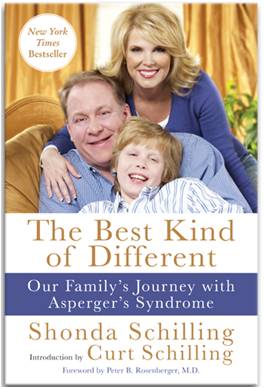Asperger’s Syndrome
- What is Asperger’s Syndrome and how is it related to autism?
- How can we explain Asperger’s syndrome?
- What are the signs and symptoms of Asperger’s Syndrome?
- Why is it so difficult to diagnosis Asperger’s syndrome?
- Can research provide insights and bring hope?
- Are there effective interventions for Asperger’s syndrome?
- What kind of academic and social support is available?
- What kind of organizational support is available?
- Can I get more information online?
- Is there any book that might help me as a parent?
What is Asperger’s Syndrome and how is it related to autism?
The National Institute of Neurological Disorders and Stroke (NINDS) of the National Institutes of Health (NIH) defines AS:
Asperger’s Syndrome, a developmental disorder, is an autism spectrum disorder (ASD), one of a distinct group of neurological conditions characterized by a greater or lesser degree of impairment in language and communication skills, as well as repetitive or restrictive patterns of thought and behavior.
How can we explain Asperger’s syndrome?
According to the National Institute of Neurological Disorders and Stroke (NINDS) at the National Institutes of Health (NIH), current research points to brain abnormalities as the cause of AS. Using advanced brain imaging techniques, scientists have revealed structural and functional differences in specific regions of the brains of children with AS. These differences are most likely caused by the abnormal migration of embryonic cells during fetal development that affects brain structure and “wiring” and then goes on to affect the neural circuits that control thought and behavior.
What are the signs and symptoms of Asperger’s Syndrome?
These signs and symptoms might be present in a child with AS:
- inappropriate or minimal social interactions;
- conversations almost always revolving around self rather than others;
- "scripted," "robotic," or repetitive speech;
- lack of "common sense;"
- problems with reading, math, or writing skills;
- obsession with complex topics such as patterns or music;
- average to below-average nonverbal cognitive abilities, though verbal cognitive abilities are usually average to above-average;
- awkward movements;
- odd behaviors or mannerisms.
Why is it so difficult to diagnosis Asperger’s syndrome?
Usually children with AS are very intelligent and verbal so it can be easy to attribute some of their behaviors to just being “different,” according to Dr. Jean Frazier, professor and vice chair of child and adolescent psychiatry, Robert M. & Shirley S. Siff Chair in Autism, and co-director of the Child and Adolescent Neurodevelopment Initiative (CANDI) at the UMass Department of Psychiatry.
Schilling recounts that in hindsight there were plenty of signs before her son’s diagnosis when Grant was seven years old. Grant’s behavior, having outgrown the “cuteness,” had become more embarrassing and uncontrollable. Schilling found herself withdrawing.
Signs and symptoms of AS include inappropriate or minimal social interactions, lack of “common sense”, odd behaviors or mannerisms, and more. To see the full list and other AS-related parent resources, visit https://www.umassmed.edu/psychiatry/candi/resources/families/.
Can research provide insights and bring hope?
The NINDS is one of the federal government’s leading supporters of biomedical research on brain and nervous system disorders. The NINDS conducts research in its laboratories at the NIH in Bethesda, Maryland, and awards grants to support research at universities and other facilities. Many of the Institutes at the NIH, including the NINDS, are sponsoring research to understand what causes AS and how it can be effectively treated.
Are there effective interventions for Asperger’s syndrome?
The good news is “yes.” “If your child has AS, early intervention is essential. Intervention involving educational and social training, performed while a child’s brain is still developing, is highly recommended,” says Dr. Frazier. The ideal intervention for AS involves autism specific types of therapies to address core symptoms of the disorder.
Dr. Frazier states that children with AS may benefit from the following forms of treatment:
- specialized educational interventions;
- social skills training;
- speech and language therapy;
- occupational therapy with sensory integration training for younger children, in which they are desensitized to stimuli (such as sound or light) to which they’re overly sensitive;
- psychotherapy or behavioral/cognitive therapy for older children;
- medications for impairing emotional or behavioral challenges; and
- parent education and training.
What kind of academic and social support can I find?
There are many support groups now and we are seeing more characters in movies and television shows with AS so people are starting to understand it.
Schools are also better prepared. There are all kinds of children in the classroom now and the next generation of teachers want to work with children like that.
What kind of organizational support can I find?
Autism Network International (ANI)
P.O. Box 35448
Syracuse, NY 13235-5448
jisincla@syr.edu
https://www.autismnetworkinternational.org/
Autism Research Institute (ARI)
4182 Adams Avenue
San Diego, CA 92116
director@autism.com
https://www.autism.org
866-366-3361
Autism Society of America
4340 East-West Highway, Suite 350
Bethesda, MD 20814
http://www.autism-society.org
301-657-0881
800-3AUTISM (328-8476)
National Institute of Mental Health (NIMH)
National Institutes of Health, DHHS
6001 Executive Blvd. Rm. 8184, MSC 9663
Bethesda, MD 20892-9663
nimhinfo@nih.gov
http://www.nimh.nih.gov
301-443-4513
866-415-8051
301-443-8431 (TTY)
National Institute on Deafness and Other Communication Disorders Information Clearinghouse
1 Communication Avenue
Bethesda, MD 20892-3456
nidcdinfo@nidcd.nih.gov
http://www.nidcd.nih.gov
800-241-1044
800-241-1055 (TTD/TTY)
MAAP Services for Autism, Asperger Syndrome, and PDD
P.O. Box 524
Crown Point, IN 46308
info@aspergersyndrome.org
219-662-1311
Can I get more information online?
The web offers a wide range of information on AS and other non-verbal learning disabilities. Below is a limited list of some of the online resources.
ASPEN (Asperger Syndrome Education Network)
The website of this non-profit organization, headquartered in New Jersey, offers information on education, support, and advocacy for people with Asperger's Syndrome and other Autism Spectrum Disorders.
Asperger's Association of New England (AANE)
Particularly focused in the New England area, this site offers information on support groups, services, grants, resources, events and more.
Asperger Syndrome and High Functioning Autism Association
Primarily a support group for parents in New York, this site also offers comprehensive information and links on high-functioning special needs, Asperger’s and autism.
Aspergia
This website offers parents a different perspective on AS, one in which AS is considered not a condition or a developmental difficulty but rather a set of traits representing a step forward in human evolution.
MAPP Services
More Advanced Individuals with Autism, Asperger's Syndrome (MAPP), and Pervasive Developmental Disorder (PDD) is a site offering a plethora of relevant resources and information.
Nemours Foundation
Nemours is one of the nation’s leading pediatric health systems dedicated to advancing higher standards in children’s health.
O.A.S.I.S. (Online Asperger’s Syndrome Information and Support)
An award-winning website widely considered to be the ultimate online resource for AS, was written and is maintained by the authors of "The Oasis Guide to Asperger Syndrome," who also are parents of children diagnosed with Aspergers.
Additional information on Asperger's Syndrome:
For more information on neurological disorders or research programs funded by the National Institute of Neurological Disorders and Stroke, contact the Institute's Brain Resources and Information Network (BRAIN) at:
BRAIN
P.O. Box 5801
Bethesda, MD 20824
(800) 352-9424
http://www.ninds.nih.gov
Is there any book that might help me as a parent?
 The Best Kind of Different by Shonda Schilling, wife of Major League Baseball All Star, former Boston Red Sox, and World Series championship pitcher, Curt Schilling. Here she tells the inspiring story of their son, Grant’s, AS?the struggles to cope with behavioral problems before the diagnosis; the difficulty in identifying the diagnosis; and the challenges and triumphs of the family’s journey with AS.
The Best Kind of Different by Shonda Schilling, wife of Major League Baseball All Star, former Boston Red Sox, and World Series championship pitcher, Curt Schilling. Here she tells the inspiring story of their son, Grant’s, AS?the struggles to cope with behavioral problems before the diagnosis; the difficulty in identifying the diagnosis; and the challenges and triumphs of the family’s journey with AS.


